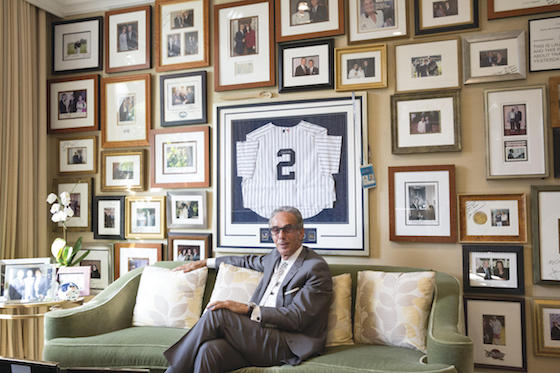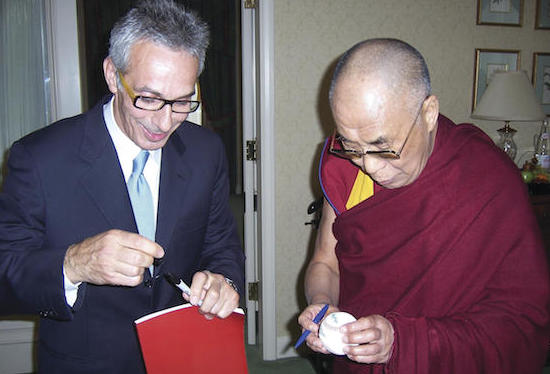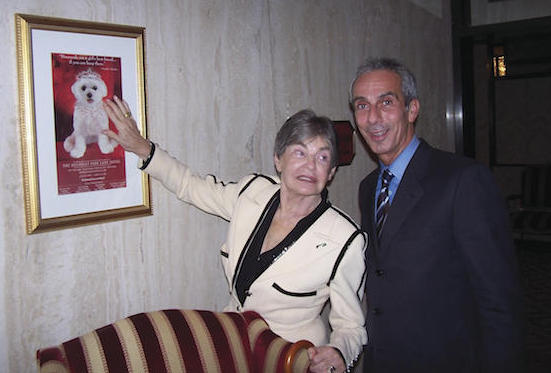Ed Mady should write the book on luxury hotelkeeping. Even though he never stops refining his craft, the 65-year-old has his work down to a science.
He has learned from some illustrious hoteliers – from the irascible Leona Helmsley at the Helmsley Palace in the 1980s, who often taught him what not to do during his first tour of duty in New York City; to Horst Schulze, a master of modern luxury who for the following 20 years taught Mady the science of hospitality during the rigorous Malcolm Baldrige National Quality Award process; and for the most recent eight years with the graceful and multi-culturally savvy Christopher Cowdray, CEO of the Dorchester Collection, who entrusted Mady to lead ultra-luxury experiences. Mady calls him his greatest boss.

Mady, meticulous general manager of The Beverly Hills Hotel and West Coast regional director for the Dorchester Collection, says he earned his street MBA during his youth outside gritty Detroit in Windsor, Ontario; his book MBA by chasing Baldrige awards with Ritz-Carlton; and his sports MBA with his professional baseball “coaches” and friends Joe Torre, Derek Jeter and Tony LaRussa. Throw in a dose of entrepreneurialism, enterprise, diplomacy and a huge scoop of humility, and it’s why the readers of HOTELS chose Mady as HOTELS’ 2017 Independent Hotelier of the World.
Ed Mady is HOTELS 2017 Hotelier of the World: to read the feature on William Heinecke, our 2017 Corporate Hotelier of the World, click here.
Mady’s open, honest and unassuming demeanor is the same whether engaging Hollywood celebrities entering his Beverly Hills Hotel or the bellmen carrying their bags. “If you look at culture and what you want to do with people, timely, transparent communication is a really big ticket that drives trust,” said Mady, who sets up the workplace environment in such a manner that staff want to learn, feel like they are growing and want to stay. “The other part is having people understand what is vulnerability. Vulnerability is not a weakness. The moment everyone agrees what they are vulnerable about, you help each other, and that creates a culture.”
In the end, it’s team
During two days of conversations with Mady at the Beverly Hills Hotel, he reiterates that the team makes or breaks the property and its leaders. “They are at the heart of what I think and do, and they are why I have created a positive, personal coaching strategy as my foundation for leadership. Individuals respond to this type of affirming behavior,” said the man who, among other things, prepared for this interview with outlines about his “personal board of directors” and the “iconic people” who had a huge impact on his career, as well as links to Harvard Business Review articles he penned that best explain his style. But based on his affable, laid-back style, you’d never know he operates as such a business scientist.

“This concept of timely transparency strongly motivates me,” Mady continued. “I feel compelled to be transparent and communicative with the team – always. Without that, there is no trust in the coach or leader. If you are not transparent, people become afraid. And if you let people become afraid, you can encourage a culture of gossip and fear. Transparency gives people peace of mind, and it in turn makes people feel safe. It is essential to me that my team feel safe.”
“Professor” Mady adds that GMs also need to be deliberate in telling the team where they want to go, rather than simply what to do. His formula for launching an initiative is simple: Create awareness, roll out, get buy-in (a key step) and follow up to reinforce. “This is the heart and soul of how I lead a team,” he said. “We all believe in this strategy because a vision is only achievable once everyone understands it.”
Mady’s teaching style is not lost on some of his mentors. “He empowers but stands beside his staff to advise,” Schulze reflected. “He hires people to be part of something, not just to fill functions. He creates trust in the organization so people work with him and for him. He creates excellence.”
From grit to glamour
Mady’s parents gave him his first taste of hospitality as a youth filling the fountain dispensers at their Baker’s Bar & Grill in Windsor. He attended the hotel program at the local college and soon after landed his first job, in 1974, as night chef at Canadian Pacific’s Chateau Lake Louise in Edmonton, Alberta. He moved to the Royal York in Toronto and worked his way up to assistant F&B director, followed by his first executive job as F&B director in Curacao. Realizing he didn’t like the island life, Mady returned to Toronto and worked in F&B management for the next four years at the original Four Seasons hotel, the Inn on the Park, where he got his first exposure to true luxury under GM Klaus Tenter.

Mady grabbed an opportunity to move to New York as the number three in charge at the Helmsley Palace, ruled by the notorious Leona Helmsley, dubbed the “Queen of Mean” for her reputation as a no-nonsense owner who would fire staff on a whim. Unsurprisingly, the two executives ahead of Mady were jettisoned in quick order and he became the number two for the next five years, regularly picking up messes created by Helmsley and quietly shielding and earning the trust of the line staff. He survived what he called “Marine Corps training” and developed his ability to inspire employees, manage crises and keep teams in sync.
“Leona actually fired me a week before I got my green card and when she fired me she rehired me in the same breath,” Mady recalled with a chuckle. “She liked me because she never smelled fear, and she taught me that fear is not a motivator. She led with fear. She wanted to intimidate and called employees ‘the little people.’ I learned what not to do as a leader, and for that knowledge I am grateful.”
In 1988, Mady met Schulze and got his first GM job offer at age 36. He jokes that Schulze figured if someone could thriveunder Helmsley for five years, they were ready to become a Ritz-Carlton GM.
Mady spent the next two decades with The Ritz-Carlton Hotel Co., serving most prominently as vice president and area general manager overseeing five properties.
Under Schulze, Mady played a pivotal role in coaching teams to master 1,000 process checkpoints over five categories needed to win the coveted Baldrige award. They captured an unprecedented two awards in the 1990s – a first for the hospitality industry. These scientific processes became the backbone of his management philosophy.
Schulze says Mady took over his first hotel in New York when guest and employee satisfaction was the worst in the system. “After two years there, when the union was renegotiating, employees insisted the union accept the Ritz-Carlton credo as part of the contract. That is unbelievable,” Schulze said. “And even though it was a union hotel, it became the number one satisfaction hotel in the company, and Ed was able to get more people promoted out of that hotel. He is a great teacher and organizer.”
Dorchester years
Mady also says if leaders can’t explain their vision, teams will not follow, and follow him they did. At the end of his Ritz-Carlton run and a planned return to The New York Palace in 2009 under the new ownership of Dorchester Collection, Mady convinced 36 associates at the Ritz-Carlton San Francisco to move and work with him in New York.
When he returned to California less than three years later to run the Beverly Hills Hotel and remake the Bel-Air, again taking several team members back across the country, he found his management skills put to the ultimate test. A boycott by Hollywood activists started in 2014 after the Sultan of Brunei, Dorchester Collection’s owner, imposed strict Sharia law in his home country. Protests and lost revenue persisted for the good part of three years, but it finally subsided and today Mady says financial results are as good as they get.
Mady rebuilt demand through his employees. “If you can give them a sense of purpose while they’re here, it fosters a great guest experience,” he says, adding, “You never really know how much sales are hidden until you start talking to the customer the way they want to be spoken to.”
Baseball star and manager Joe Torre, who became a good friend of Mady during his New York years, says while Mady was going through the rough patch at The Beverly Hills Hotel his staff continued to feel engaged. “That was huge,” Torre said. “I always wanted to learn as a player and manager, and that is Eddie all the time – always looking for innovation… You compete against yourself as that is the challenge when you are at the top, and Ed doesn’t miss a trick.”
Mady says he would consider returning to New York City and his beloved Yankees if Dorchester Collection finds a new hotel there (it sold The New York Palace in 2011). “It’s always difficult to open a new product, but it’s also a lot of fun when you put together a new hotel,” he added. “So that’s my power alley. That’s my thing.”
What is not Mady’s thing is retirement. “I need to work,” he said. “I need to feel tired. James Brown was asked how he was feeling while he was in prison. ‘I am well rested,’ he replied, ‘but I miss being tired.’ That’s what we are in the hotel industry.”

